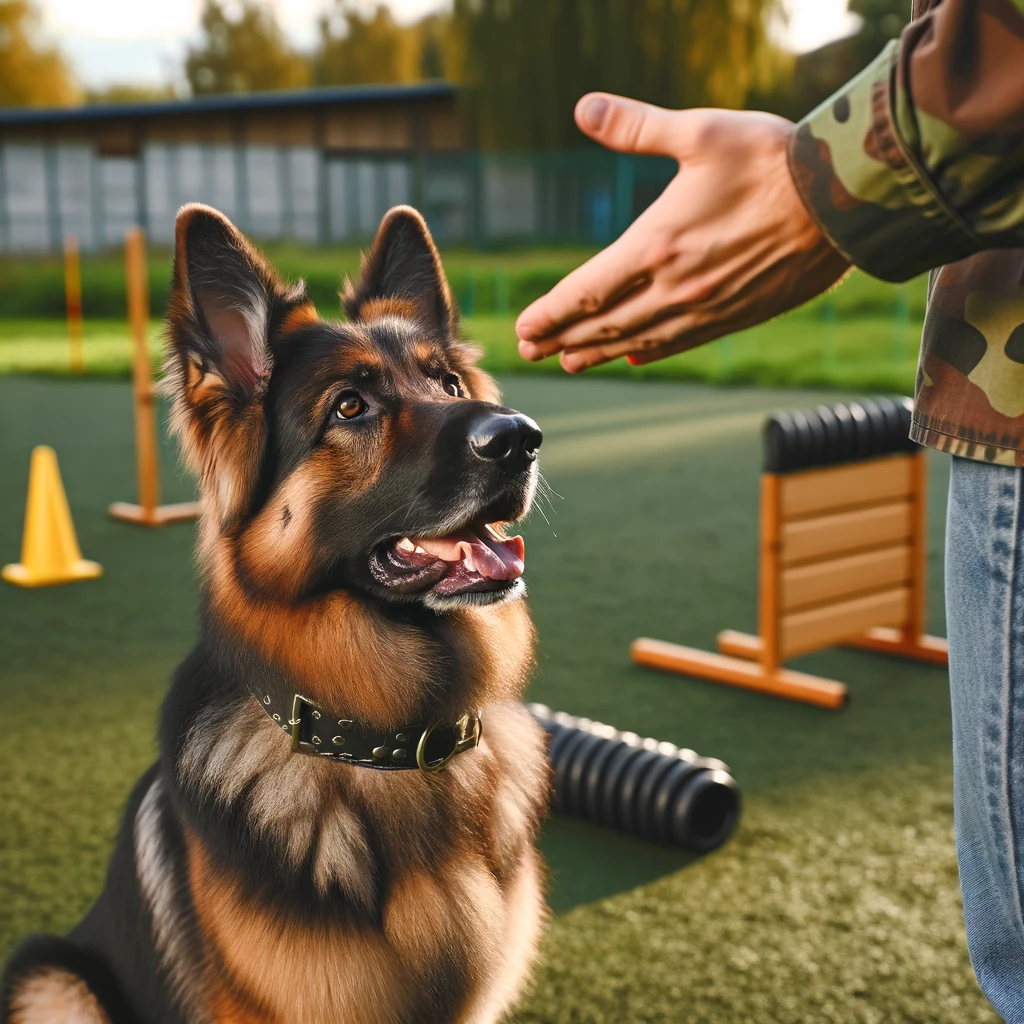NO, German Shepherds do not understand German or any specific language; they respond to the tone, emotion, and consistency of commands regardless of the language used.
They can be trained to respond to commands in German or any other language through consistent and positive reinforcement.

How Dogs Perceive Language
Before analyzing German Shepherds specifically, it is essential to understand how dogs perceive human language in general.
Extensive research indicates that dogs do not comprehend language in the same nuanced manner as humans.
They pay more attention to word patterns, tone of voice, body language, and inflections rather than the actual meaning of words or the language used.
Dogs can learn to recognize certain words or phrases in any language if these vocal cues are used consistently during training.
Consistency helps dogs associate specific words with actions, rewarding behaviors, or commands. So, a dog’s understanding depends more on conditioning through consistent training rather than an innate sense of a language.
The Intelligence and Trainability of German Shepherds
Now that we’ve explored dogs’ general linguistic capability, we can better analyze our original question regarding German Shepherds.
This breed is renowned for its intelligence, alertness, willingness to work, and ease of training.
German Shepherds consistently rank among the top working and obedience breeds in tests measuring working intelligence.
Their superior trainability enables them to learn commands, routines, and skills more quickly than other breeds.
This trainability does not necessarily mean they have an inborn preference for German. With patient training and consistency, German Shepherds can learn commands in German, English, Spanish, or other languages.
The Breed’s German Origins
First, We must look at the breed’s origins to understand whether German Shepherds understand German.
German Shepherds were initially bred in Germany in the 1800s as versatile herding dogs used to guard and herd sheep.
Their crucial role was following verbal commands to control flocks properly.
Due to this background, some speculate that German Shepherds may understand German better because commands were initially taught exclusively in German.
There is no definitive scientific evidence proving this innate preference.
Training German Shepherds in Different Languages
Despite their name, German Shepherds are exceedingly popular globally as working dogs.
Their linguistic capabilities are evident as military, police, and service forces in non-German-speaking countries successfully train them in local languages.
For example, in the UK, military and police German Shepherds fully comprehend English commands. In France and Germany, Shepherds work effectively after training exclusively in French.
Even within Germany today, many German Shepherds are taught in English rather than German.
Their adaptability to cues in different languages demonstrates that German Shepherds can learn any language with proper conditioning. Their German heritage does not limit their linguistic abilities.
The Adaptability of German Shepherds
In addition to languages, German Shepherds also readily adapt to new environments, routines, people, and work purposes.
This flexibility highlights why they excel as guide dogs, search and rescue dogs, bomb or drug detection dogs, and in other roles across the globe.
If the breed had an exclusive affinity for German, their global spread and versatility in service roles would have been severely limited.
The fact that they thrive learning different languages and customs underlines their inherently adaptable nature.
The Significance of Consistency in Training
While adaptable, German Shepherds require and respond best to consistent training methods and commands.
Consistency is far more critical than the specific language used. A German Shepherd will reliably learn and obey if the verbal cues, tone, body language, and training techniques are consistent.
Training a German Shepherd exclusively in German has no particular benefit over any other language.
What matters is using the same vocabulary, reward system, training schedule, vocal tone, and commands during instruction.
Anecdotal Evidence of Multilingual German Shepherds
Beyond scientific research into canine linguistics, plenty of anecdotal evidence highlights the multilingual capabilities of German Shepherds:
- Belgian military Malinois Shepherds understand Dutch just as well as their German counterparts understand German.
- Testimonials from owners worldwide highlight German Shepherds adapting smoothly to Hungarian, Japanese, Swahili commands and more.
- Guide dogs are often trained first in German and then re-trained easily in a new language when adopted internationally.
- Police German Shepherds adeptly follow commands in the local language after transferring between precincts or countries.
Expert Opinions on Dogs’ Language Comprehension
Animal behaviorists and dog cognition experts confirm that breed heritage and name are inaccurate indicators of a dog’s language capabilities.
As renowned veterinarian Dr. Sophia Yin explains, “People erroneously assume that if they speak German, their shepherd will understand better.
This is false… Dogs don’t understand any language, sounds.”
Instead of the language, experts emphasize key training factors like tone, reward-based reinforcement, patience, consistency, repetition, and hand signals to teach commands successfully.
Neurological Insights on Speech Processing in Dogs
Neurological studies on language processing in dogs explain why they innately do not comprehend languages.
Research shows dogs primarily use the right hemisphere of their brains to process speech rather than the left hemisphere, which is specialized for language processing in humans.
This crucial neurological difference affects their capacity to understand vocabulary, grammar, and other complex linguistic patterns.
Practical Tips for Training German Shepherds
When welcoming a German Shepherd into your home, the language you choose to train it in should suit your own needs rather than assumptions about the breed’s heritage.
Here are some tips for practical training:
- Use short, consistent verbal cues, such as “Sit,” “Stay,” and “Heel.”
- Reinforce commands with hand signals and rewards like treats or praise.
- Train for short, focused sessions daily rather than long, irregular ones.
- Be patient and consistent – dogs learn through repetition over time.
- Speak calmly and clearly when issuing commands.
- Start training early and socialize your German Shepherd puppy.
While German Shepherds are cerebral canines, research shows they rely more on non-verbal cues and conditioning than an inherent understanding of human languages.
With proper training tailored to the individual dog, they can learn to respond reliably to any language their owner uses.
The Bottom Line
To summarize, while German Shepherds recognize words and commands exceptionally well compared to other breeds, they do not possess an innate preference or ability to comprehend the German language precisely simply because of their origins.
Their adaptability to learn different languages through consistent training rather than breed genetics makes them sought-after working dogs worldwide.
Hopefully, this overview of German Shepherds’ linguistic capabilities provides a detailed and insightful answer to our original question!

I’m Martin, and I grew up in the super cool city of Seattle. You know, the place with all the incredible mountains and forests? Yeah, that’s my playground!
Ever since I was little, I’ve been all about nature. I used to wander around the woods with a notebook, doodling all the cool plants and animals I’d find.
